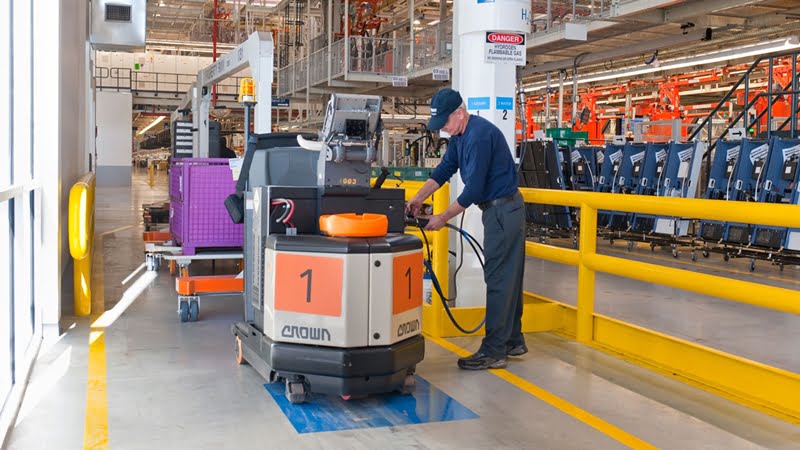Anyone involved in forklift fleet management who is also interested in running a more efficient and cost-effective warehouse might want to look into fuel cells. According to a study by the Breakthrough Technologies Institute (BTI is a non-profit [501(c)(3)] independent, educational organization), “Fuel cell users are saving money on fuel and labor costs, lowering emissions, and yielding substantial energy savings through increased efficiency and reliability.”
Sounds pretty good, right? Now, sometimes new technology or ideas might seem a bit risky, so here’s a sampling of some Fortune 500 companies that have put fuel cells to work in their operations:
Adobe, Apple, AT&T, Baker Hughes, Bank of America, CenturyLink, Coca-Cola, CVS Caremark, eBay, FedEx, Google, JP Morgan Chase, Juniper Networks, Kellogg’s, Kimberly-Clark, Kroger, Lowe’s, Macy’s, Microsoft, Owens Corning, Procter & Gamble, Safeway, Staples, Sysco, Target, Urban Outfitters, United Natural Foods, Verizon, Walmart, Whole Foods, Williams-Sonoma, Xilinx, and Yahoo!.
Why Fuel Cells and Forklifts?
Now, not every company using fuel cell technology is a behemoth in the private industry. Many smaller companies and municipalities are utilizing fuel cells because fuel cells generate continuous power for demanding machinery such as forklifts. This technology then provides significant energy and cost savings to the warehouse. With such potential for reliable energy without high costs, fuel cell forklift deployment has tripled since 2013.
BMW Environmental Services Manager Briggs Hamilton sums up how his company is more efficient with fuel cell technology, saying, “This project actually avoids 1.8 million kilowatt-hours per year of electricity consumption (otherwise needed) to change batteries. If you don’t buy electricity, you avoid about 1,200 tons per year of carbon emissions.”
Efficiency Beyond Consumption
Fuel cell technology doesn’t just help a warehouse and forklift fleet become more efficient by using less energy. Fuel cells can operate for entire six to eight hour shifts on one tank of hydrogen with no voltage sag. Since fuel cells don’t need to be swapped out every few hours and charged, like batteries do, warehouses no longer need to use space for charging or storage areas and can repurpose that space for other purposes. Not to mention, the vehicle operator can now easily refuel forklifts, meaning staff usually assigned for battery swaps and recharging can be reassigned to other tasks within the warehouse.
Kroger, Ace Hardware, Central Grocers, and Walmart have all done trial runs with fuel cell forklifts that were so successful they decided to make fuel cell technology part of their permanent solutions for efficiency and cost-savings. Central Grocers, for example, saw a 98% increase in uptime during their one year trial and since bought 182 fuel cell forklifts.
If you are a fleet manager considering the jump to fuel cell technology, consider contacting HCO Innovations for an evaluation and some ideas to move forward.


